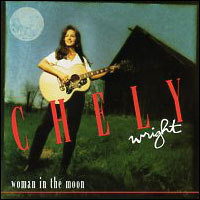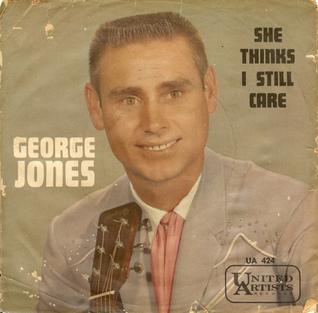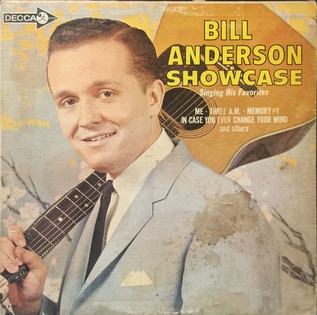Related Research Articles

Connie Smith is an American country music singer and songwriter. Her contralto vocals have been described by music writers as significant and influential to the women of country music. A similarity has been noted between her vocal style and the stylings of country vocalist Patsy Cline. Other performers have cited Smith as influence on their own singing styles, which has been reflected in quotes and interviews over the years.

James William Anderson III, known professionally as Bill Anderson, is an American country music singer, songwriter, and television host. His soft-spoken singing voice was given the nickname "Whispering Bill" by music critics and writers. As a songwriter, his compositions have been covered by various music artists since the late 1950s, including Ray Price and George Strait.

Woman in the Moon is the debut studio album by American country music artist Chely Wright. The album was released on August 9, 1994 via Polydor Nashville and was produced by both Barry Beckett and Harold Shedd. It was one of two albums Wright would release under the label. Wright co-wrote five of the ten tracks on the record. The album contains the singles "He's a Good Ole Boy", "Till I Was Loved by You", and "Sea of Cowboy Hats". None of these singles reached top 40 on the Billboard Hot Country Songs charts. The album received mixed to positive critical reception for its lyrical content and sound.

"Once a Day" is a song written by Bill Anderson and recorded as the debut single by American country artist Connie Smith. It was produced by Bob Ferguson for her self-titled debut album. The song was released in August 1964, topping the Billboard country music chart for eight weeks between late 1964 and early 1965. It was the first debut single by a female artist to reach number one on the Billboard Hot Country Songs. This song peaked at number one for the week of November 28, 1964, and it stayed at number one for eight consecutive weeks, a record for a female solo artist for nearly 50 years, until it was surpassed by Taylor Swift's "We Are Never Ever Getting Back Together" in December 2012.

Cute 'n' Country is the second studio album by American country music artist Connie Smith. It was released in October 1965 by RCA Victor and contained 12 tracks. Cute 'n' Country contained a mixture of original songs and cover versions by other country artists. Featured on the album was the top ten single "I Can't Remember". Cute 'n' Country was Smith's second album to top the Billboard country LP's chart.
"I Can't Remember" is a song written by Bill and Bette Anderson, and recorded as a single by American country artist Connie Smith. It was produced by Bob Ferguson and was released on her 1965 album Cute 'n' Country. The song was released in April 1965, reaching the Top 5 on the Billboard country music chart and becoming her third Top 10 hit. It was Smith's third single released under the RCA Victor label.

Connie Smith is the debut studio album by American country music artist Connie Smith. It was released in March 1965 by RCA Victor and was produced by Bob Ferguson. The album included Smith's debut single, "Once a Day". The song became her signature recording and biggest hit, reaching number one on the Billboard country songs chart.

Miss Smith Goes to Nashville is the third studio album by American country singer Connie Smith. It was released in March 1966 by RCA Victor and contained 12 tracks. The album contained original material including several tracks penned by Smith's mentor Bill Anderson. Miss Smith Goes to Nashville reached number two on the country LP's chart in 1966 and included the top five singles "Nobody But a Fool " and "If I Talk to Him".

Born to Sing is the fifth studio album by American country singer Connie Smith. It was released in September 1966 by RCA Victor and contained 12 tracks. The album was her first to include string instrumentation. It reached the top five of the Billboard Country LP's chart and included the single "Ain't Had No Lovin'".

Connie Smith Sings Bill Anderson is the eighth studio album by American country singer Connie Smith. It was released in May 1967 by RCA Victor and featured 12 tracks. The album was dedicated to her mentor, Bill Anderson. It contained several songs made popular by Anderson himself, along with several tracks made popular by other performers. It also included the newly-recorded "Cincinnati, Ohio". Smith released her version as a single, which climbed into the top five of the American country songs charts. The album received favorable reviews following its release.

The Best of Connie Smith is a compilation album by American country singer Connie Smith. It was released in September 1967 by RCA Victor and featured 12 tracks. The disc was Smith's first compilation project released in her career and featured her most popular singles made commercially successful between 1964 and 1967. It also featured one new recording titled "I'll Come Runnin'". Penned by Smith herself and released as a single, the song became a top ten hit on the American country songs chart in 1967.

The Best of Connie Smith Volume II is a compilation album by American country singer Connie Smith, released in March 1970 by RCA Victor, her second "Best Of" compilation. The album compiled Smith's most popular singles between 1967 and 1969. The album reached the top 30 of the American country albums chart following its release. Also included was two new recordings. Of these new recordings, one was released as a single in 1969. Titled "You and Your Sweet Love", it reached the top ten of the country singles chart.

"If It Ain't Love" and Other Great Dallas Frazier Songs is nineteenth solo studio album by American country singer Connie Smith, released in July 1972 by RCA Victor. The album is a collection of songs composed by songwriter Dallas Frazier. Three of these songs were duets between Smith and Frazier himself. The album's title track was spawned as a single in 1972 and reached the top ten of the American country chart. The album itself reached the top 20 of the American country LP's chart and it received a positive review from Billboard magazine.
"Then and Only Then" is a song written by Bill Anderson and recorded by the American country artist, Connie Smith, on her Connie Smith album. It was produced by Bob Ferguson and released in January 1965, reaching the Top 5 on the Billboard country music chart in early 1965, becoming her second major hit. It was her follow-up single to her multi-week number one hit, "Once a Day", which was released the previous year.

"She Thinks I Still Care" is a country song written by Dickey Lee and Steve Duffy. The song was recorded by multiple artists, including George Jones, Connie Francis, Anne Murray, Elvis Presley and Patty Loveless.
"If I Talk to Him" is a song written by Dolores Edgin and Priscilla Mitchell, and released as a single by American country artist Connie Smith. It was produced by Bob Ferguson and released on her 1966 studio album Miss Smith Goes to Nashville. The song was released in August 1965 and reached the Top 5 on the Billboard Magazine country music chart, becoming her fourth Top 10 single. The song was recorded under RCA Victor Records.

The albums discography of Connie Smith, an American country artist, consists of 40 studio albums, one live album, 14 compilation albums, three box sets, and 26 other appearances. After the success of her 1964 single "Once a Day", Smith's self-titled debut album was released in March 1965 on RCA Victor Records. The album reached number one on the Billboard Top Country Albums, spending thirty weeks on the chart, while also becoming her only album to reach the Billboard 200 list (#105). Smith's next two secular albums, Cute 'n' Country and Miss Smith Goes to Nashville went to number one and number two respectively between 1965 and 1966. In September 1966 Smith released her fifth studio album, Born to Sing, which was her third album to reach the top spot on the Billboard country albums chart. Due to Smith's popularity, RCA Victor issued five albums between 1967 and 1968 including Downtown Country (1967), Connie Smith Sings Bill Anderson (1967), and I Love Charley Brown (1968). In 1969, Smith collaborated with country artist Nat Stuckey on the album Young Love.

Bad Seed is a studio album by American country music artist Jan Howard. It was released in November 1966 via Decca Records and featured 12 tracks. The third studio album of her recording career, Bad Seed was named for its title track, which reached the top ten of the country charts in 1966. The disc was met with a favorable review from Cashbox following its release.

Showcase is a studio album by American country singer-songwriter Bill Anderson. It was released in November 1964 on Decca Records and was produced by Owen Bradley. The album was Anderson's third studio release as a recording artist and second to be released in 1964. It included two singles that became major hits on the Billboard country chart along with subsequent B-sides.

The singles discography of American country music artist Lynn Anderson contains 72 singles, three promotional singles, one charting B-side, two music videos and nine other song appearances. She signed her first recording contract with Chart Records in 1966. The following year, her single "Ride, Ride, Ride" debuted on the Billboard Hot Country Singles chart. Also in 1967, her single "If I Kiss You " became her first major hit when it reached number five on the country singles chart. Anderson had a series of hits that reached the top ten and 20 during the 1960s including "Promises, Promises" (1969), "No Another Time" (1968), "Big Girls Don't Cry" (1968) and "That's a No No" (1969).
References
- ↑ "Connie Smith: Biography". Connie Smith Music.com. Retrieved 2009-08-20.
- ↑ "Second Hand Songs - "Nobody But a Fool"". Second Hand Songs.com. Retrieved 4 February 2010.
- ↑ "Legend's Corner - Connie Smith". About.com . Retrieved 4 February 2010.